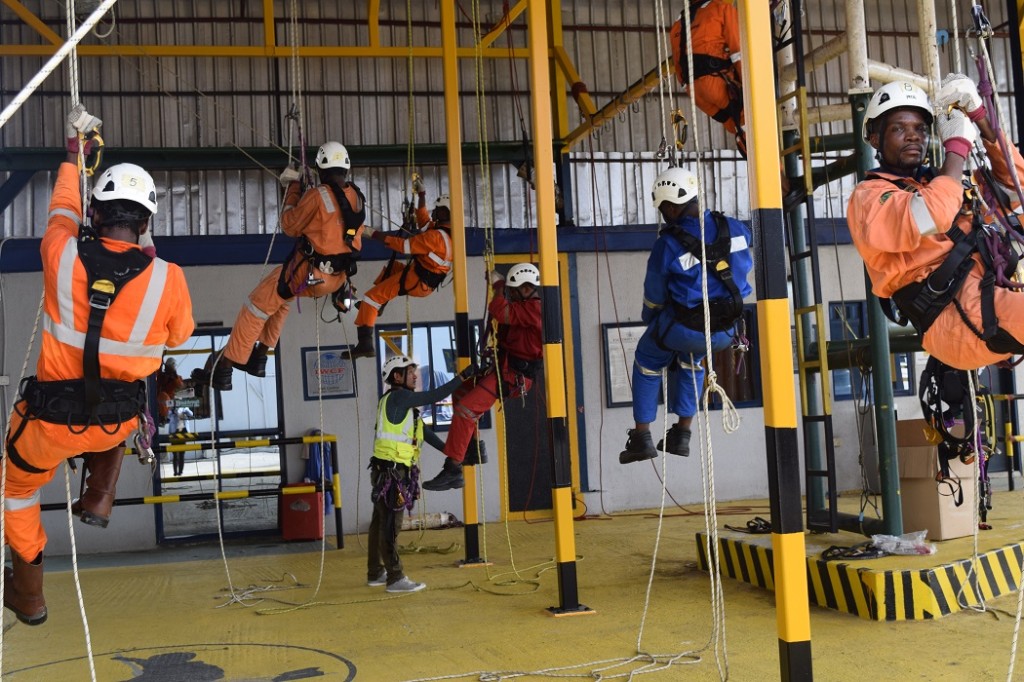
Standard Best Practices For Rope Access Operations.

Safety stands as the cornerstone of every occupation, and rope access is no exception. Considering the inherent risks associated with working at elevated heights, adherence to rigorous safety protocols is imperative.
The following are some safety protocols to adhere to before and during rope access operations:
1. Only trained and certified personnel should carry out rope access operations:
Firstly, before engaging in any rope access operation, it is essential for a technician to undergo comprehensive training and certification at an accredited centre like JC International. This training should cover a range of topics, including; rope techniques, equipment usage, emergency procedures, and rescue protocols. By ensuring that all team members are adequately trained and certified, companies can minimize the likelihood of accidents and injuries on the job.
2. Regular equipment inspection and maintenance:
Another critical aspect of rope access safety is the regular inspection and maintenance of equipment. These include ropes, harnesses, carabiners, descenders, and other gear used in rope access operations. Before each use, equipment and gears should be thoroughly inspected for signs of wear, damage, or deterioration. Any faulty or damaged equipment should be immediately replaced to prevent accidents and ensure the safety of workers.
3. Strict adherence to safety protocols:
Rope access professionals must adhere strictly to established safety protocols and procedures at all times. This includes conducting thorough risk assessments before each job, implementing appropriate safety measures, and maintaining clear communication among team members. Additionally, adherence to industry standards and regulations, such as those outlined by IRATA (the Industrial Rope Access Trade Association) or SPRAT (the Society of Professional Rope Access Technicians), is essential for ensuring compliance and minimizing risks.
4. Close monitoring and supervision during operations:
During rope access operations, continuous monitoring and supervision are essential to identify any potential hazards or risks as they arise. Supervisors should oversee operations closely, providing guidance and support to workers as needed. Additionally, implementing a buddy system, where workers check each other’s equipment and safety measures, can provide an extra layer of protection and accountability.
5. Weather monitoring and assessment:
Weather conditions can significantly impact the safety of rope access operations, especially when working outdoors or in exposed environments. Therefore, monitoring and assessing weather conditions are essential safety protocols. Rope access professionals (technicians) should closely monitor weather forecasts and assess factors such as wind speed, precipitation, and temperature before and during operations. If adverse weather conditions are present or predicted, operations should be postponed or suspended until conditions improve to ensure the safety of workers.
6. Appropriate fall protection systems should be in place:
Fall protection systems are essential safety protocols in rope access operations, especially when working at heights. These systems include the use of harnesses, lanyards, and anchor points to prevent falls and minimize the risk of serious injuries. It’s crucial for rope access professionals to ensure that fall protection equipment is properly fitted, regularly inspected, and used correctly during all operations. Additionally, anchor points should be securely attached to stable structures capable of supporting the intended load to prevent anchor failures.
JC International is a leading provider of IRATA level 1, 2 and 3 rope access training in Nigeria. Our courses equip trainees with the knowledge of rope access, safety requirements and quality assurance procedures.
Contact us to Learn more.

Leave a Reply